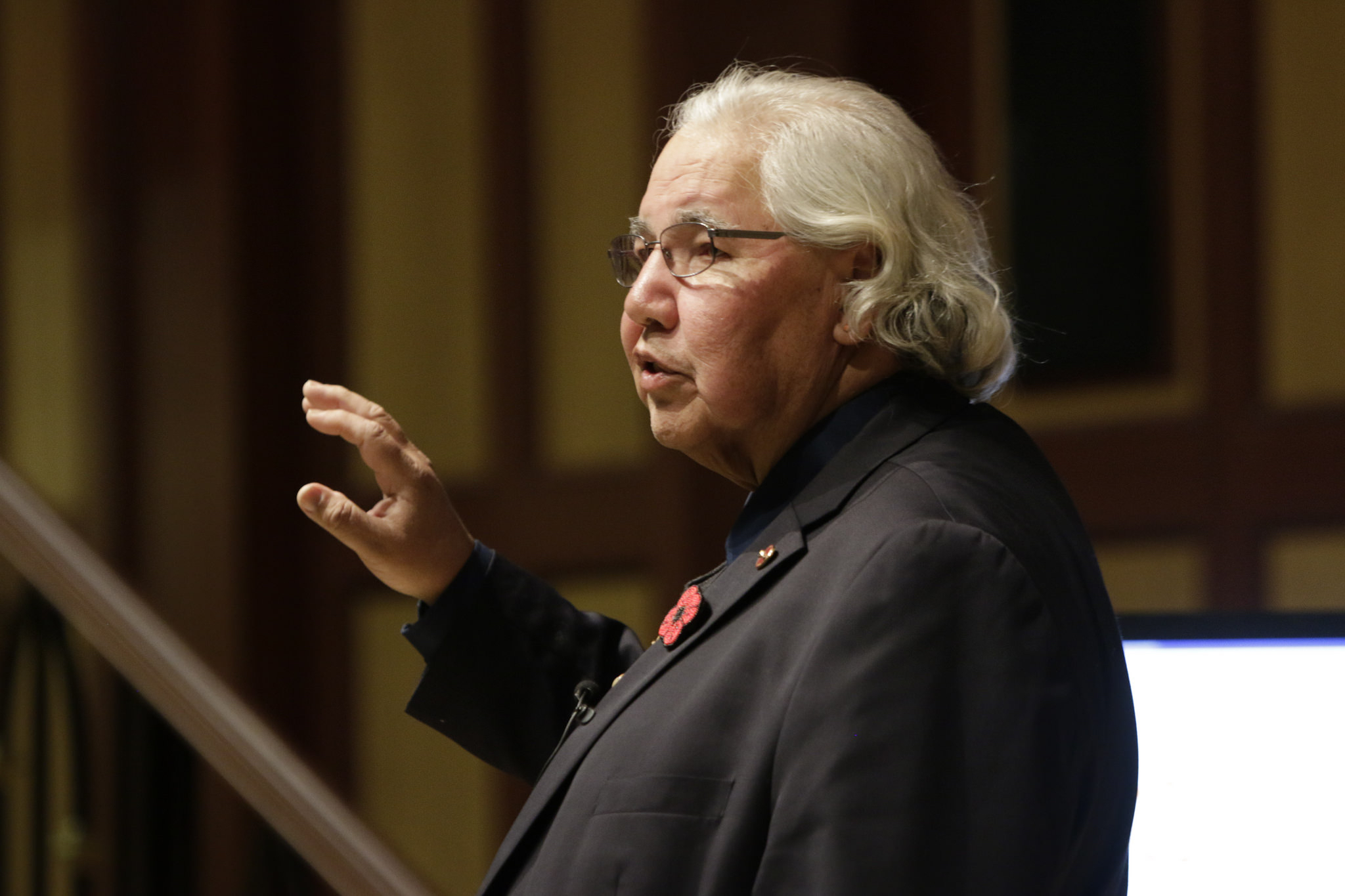“It’s up to society to step up and take the actions that are needed.”
-Senator Murray Sinclair
I wish that this statement could be the light that points forward to a new era in Canadian history. I write this knowing well that society prefers and generates simple, shortened sound bites to convey information. In today’s world, we also have the difficult experience of separating misinformation and misinterpretation from the truth; fake news from real news. My point: Senator Murray Sinclair’s statement implies much more than its simplicity might.
The upcomingconference, Community, Education, Change: Indigenous Ways of Knowing — KIHKINOOHAMAAKEWIN, presented by the Tommy Douglas Institute (TDI) at George Brown College on May 28, is one small attempt to address a pressing matter in the age of fake news. The issue before us is, in the words of Sinclair, “meaningful action toward renewing the relationship between the Crown and Indigenous people as seen through the lens of the United Nations Declaration on the Rights of Indigenous Peoples, and action in addressing the challenges faced by many Indigenous communities…”
This year the TDI, is pleased to welcome Sinclair as its keynote speaker.
The institute, conceived of by faculty at George Brown College’s Community Worker Program, and supported by Shirley Douglas and the Douglas-Coldwell Foundation, the Centre for Liberal Arts & Sciences, School of Early Childhood, GBC’s Student Association and the GBC foundation, has been fostering dialogue on education, community and social justices issues for the past six years. Past themes have included Environmental Justice, Critical Pedagogy and Education and Citizen Engagement.
The TDI will again bring together educational communities and wider communities to examine the relationships between Canada and Indigenous communities, in areas of education and community engagement.
We will be looking at the importance of Indigenous worldviews for our schools and communities; the need to rethink norms and practices at the core of mainstream education, service delivery and community organizing, while imagining what truly inclusive educational and community spaces — that honour and integrate the knowledge, contributions and potential of Indigenous peoples, for the benefit all peoples — can look like.
In addition to the opening keynote, the day-long event of breakout discussions, performances and exhibits, will conclude with the discussion panel The Path to Reconciliation in Education and Community Work.
Yet here is where I intend to depart from the usual fanfare that accompanies such events. This is not solely an opportunity to connect with the best and brightest of Indigenous academia and community. As Sinclair has pointed out on more than one occasion, reconciliation is not something that a single event can achieve. Reconciliation is something that will take generations to bring about. If we, as a society, are fortunate enough to see many more such events, we must remember that they are but steps within a much longer journey. Part of Murray Sinclair’s introduction to the Truth and Reconciliation Report TRC report reminds us that “achieving reconciliation is like climbing a mountain — we must proceed a step at a time.” Reconciliation, like any true effort at forging and repairing relationships, is not a one-day thing — any more than Indigenous existence is (as hoped) a flash in the pan of Canadian history.
To my indigenous relatives, friends, and true allies, I address a few of the issues bound to surface with this announcement:
- I understand that many Indigenous people are frustrated and impatient; Many reports and commissions have been held, with little action being done to improve our mutual relationship. This was something that community consultations with Indigenous agencies and George Brown College’s Indigenous faculty and counsellors brought to light, and which informed planning of the May 28th event.
- Many of us are still suspicious of Academia and further study of our peoples. Kihkinoohamaakewin is not just a word – nor a direct translation into English as Education. The approach to Kihkinoohamaakewin is one founded entirely on Indigenous language and experience. The direction and organization of the event began in discussion with Indigenous people themselves. What occurred in the planning process originated with an Indigenous student – fluent in his language – who spent his life growing up on reserve in the North. There are no academics here attempting to institute the latest (inaccessible) craze in Indigenous community.
- The community decided that this would not be an opportunity to simply learn more from Indigenous people working in community or education. The entire event is itself a practice in Indigenous education. The discussion circles, have been created with care and attention to detail. As intended, the discussions parallel several aspects of Indigenous learning, including: Knowing from observation, knowing from experience, and knowing from (or as part of) a relationship. The conference will rely on everyone’s participation.
Finally, there is something that all Indigenous peoples have experienced that we wish to emphasize. As with all relationships, there is a great deal of effort required — from all parties. The beginning of this new relationship is, as Sinclair puts it, “a point of fundamental change in Canada’s story, a period of change that, if sustained by the will of the people, will forever realign the shared history” of all peoples. To be sure, no money, one-day events, sit-ins, retreats, or educational conferences can achieve the relationship growth our people have been waiting for since 1594. This year’s Tommy Douglas Institute is one step among many being done across Canada; engaging in a meaningful discussion that (if done properly) should last as long as the journey toward reconciliation itself.
Relationship is everything to us. Come, spend some time with us, and help forge this new relationship. This is about all of us.
To register, visit georgebrown.ca/TommyDouglasInstitute
Tyler Pennock is the coordinator of the Community Health Worker Training Program at Anishnawbe Health Toronto, and part-time professor in George Brown College’s Community Worker Program. He is Cree from the Slave Lake region of Alberta.
Photo: Coady International Institute
Like this article? rabble is reader-supported journalism.





